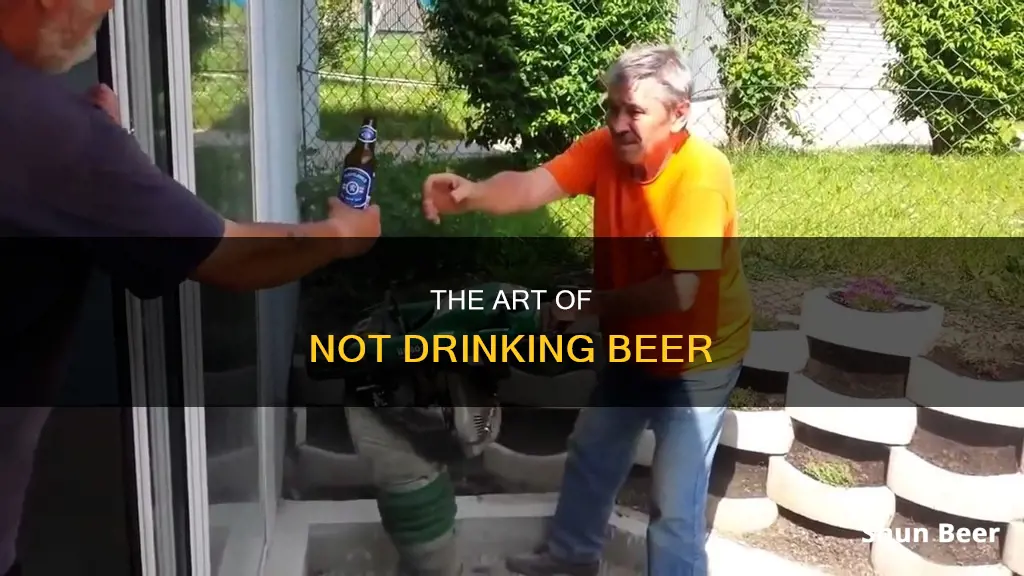
Drinking alcohol is often glorified, and the decision to stop drinking can be challenging. However, quitting alcohol can be a positive life-changing process, leading to improved physical and mental health, better relationships, and a more fulfilling life.
There are various reasons why someone might want to stop drinking beer. Beer, when consumed in excess, can lead to obesity, heart problems, liver issues, and neurological problems. It can also impair judgment, damage relationships, and leave one feeling tired and sick.
Quitting beer may require a well-thought-out plan and a strong support system. It is essential to understand the reasons behind your decision to quit and set clear and realistic goals. Getting rid of alcohol at home, avoiding tempting situations, and spending time with supportive people can also help. Additionally, staying active and finding alternative beverages or activities can be effective strategies.
For those dependent on alcohol, it is crucial to seek professional help. Withdrawal symptoms can be dangerous and should not be taken lightly. Consulting a doctor or therapist, joining support groups, and reaching out to trusted friends and family can provide valuable support during this journey.
| Characteristics | Values |
|---|---|
| Understand your reasons for quitting | E.g. health, relationships, work, etc. |
| Identify triggers | E.g. being with friends, being alone, feeling happy or anxious |
| Set clear and realistic goals | E.g. improved physical health, mental clarity, stronger relationships, etc. |
| Build a support system | E.g. family, friends, support groups, etc. |
| Discover tasty alternatives | E.g. non-alcoholic beers, mocktails, etc. |
| Develop healthy habits | E.g. exercise, mindfulness, meditation, etc. |
| Avoid peer pressure | E.g. practice ways to say no politely |
| Be persistent | Most people quit after several attempts |
What You'll Learn

Understand your triggers and avoid them
Understanding your triggers is a crucial step in reducing or stopping your drinking. Triggers are the feelings or circumstances that can cause you to drink when you didn't plan to or to drink more than you intended. They are different for everyone and can be internal or external.
Internal triggers are your emotions and the way you feel. For example, drinking alcohol can change the way you feel, and the anticipation of these effects can be a trigger for some people. Others may drink to cope with negative feelings such as self-defeating thoughts, stress, anger, guilt, or regret.
External triggers are aspects of your physical environment, the culture of the place you live, and your interactions with others. For instance, being alone or eating alone, other people offering you alcohol, or the sight or smell of alcoholic drinks can all be triggers.
To understand your triggers, it is important to get to know what they are and how to work around them. Keeping a cravings diary can be a great way to do this. Write down when, where, and why you crave a drink. For example, you might find that you tend to drink more when you're stressed at work, so stress is likely a trigger for you.
Once you understand your triggers, you can start to avoid them. Here are some strategies to avoid common triggers:
- If you tend to drink at home, stop buying alcohol with your usual food shopping or restrict how much you buy.
- Keep alcohol out of sight if you have it at home.
- Suggest meeting friends in a park instead of a bar or pub.
- Go home a different way from work to avoid passing places that trigger cravings, like pubs or bars.
- Spend more time with non-drinking friends and family.
- Explore new, neutral places to socialise that you don't associate with drinking.
- Plan how you will respond if you are unexpectedly invited to drink.
- Learn to manage moods linked to triggers, such as anger, stress, or anxiety.
- Find alternative ways to meet specific needs linked to triggers, such as hunger, tiredness, loneliness, or boredom.
While it may not always be possible to avoid triggers, understanding and avoiding them when you can is an effective way to reduce your drinking.
Drinking Beer at Disney World: What's Allowed?
You may want to see also

Develop healthy habits
Developing healthy habits is a crucial step in reducing or eliminating your beer consumption. Here are some strategies to help you on your journey:
- Exercise and physical activity: Incorporate regular exercise into your routine. This can include activities such as walking, sports, swimming, or any other physical activity you enjoy. Exercise is a great way to keep yourself busy and distracted from cravings. It also contributes to your overall health and well-being.
- Mindfulness and meditation: Meditation is an effective tool for managing alcohol addiction. It helps reduce stress, improve self-awareness, and enhance physical health. Set aside time each day to meditate, focusing on your breathing and achieving a calm state of mind.
- Healthy diet: Adopt a balanced and nutritious diet to take care of your body. Eating well will improve your physical and mental health, giving you the energy and focus to stay on track.
- Alternative beverages: Explore non-alcoholic alternatives to beer. Opt for fruit juices, herbal tea, sparkling beverages, or sports drinks. Alcohol-free beer is also an option if you crave the taste but want to avoid the alcohol content. However, be mindful that some alcohol-removed beers may still contain a small amount of alcohol.
- Hobbies and creative outlets: Engage in activities that bring you joy and fulfilment. Pick up a new hobby, revisit an old passion, or learn a new skill. This can include creative pursuits, such as painting, woodworking, playing a musical instrument, or any other activity that enriches your life.
- Supportive social circle: Surround yourself with supportive friends and family who respect your decision to quit drinking beer. Their encouragement and understanding can make a significant difference in your journey.
- Professional support: If needed, seek professional help from a counsellor, therapist, or support group. These specialists can provide valuable guidance, practical strategies, and emotional support throughout your journey.
Is Budweiser Beer Gluten-Free? Safe for Celiacs?
You may want to see also

Understand your addiction
Understanding your addiction is a crucial step in overcoming it. Alcohol addiction, or Alcohol Use Disorder (AUD), is a chronic relapsing disease that can have severe consequences on your physical and mental health. Recognising the signs of alcohol withdrawal symptoms and understanding the triggers that give you the urge to drink are important first steps.
Firstly, it's important to note that alcohol is a drug, and any type of excessive drinking can be dangerous. Even if you are only drinking beer, you can still develop an alcohol addiction. Beer has a lower alcohol by volume (ABV) than wine or spirits, but drinking too much of it can lead to serious health risks. These include liver, colon, throat, and breast cancer, as well as an increased risk of abdominal obesity or "beer belly".
How do you know if you have a problem with alcohol? Ask yourself the following questions:
- Do you think about beer constantly, even when you're not drinking?
- Can you control the amount of alcohol you drink?
- Do you take part in binge drinking (4 or more beers in one sitting) or heavy drinking (more than 2 beers per day or 8-12+ per week)?
- Is beer negatively impacting other areas of your life, such as work or relationships?
- Do you experience withdrawal symptoms and cravings when you try to quit?
If you answered yes to some of these questions, you may have an alcohol addiction. It's important to consult a doctor or healthcare professional, especially if you think you may be dependent on alcohol. They can advise on the next steps and provide support.
It's also worth noting that drinking alcohol, even in moderate amounts, may not provide any health benefits. While some studies suggest that moderate drinking may be linked to certain benefits, such as red wine and heart health, other research shows no benefit and links moderate drinking to diseases like breast cancer and an increased risk of stroke.
Beer Drinking in Minnesota State Parks: What's Allowed?
You may want to see also

Build a support system
Building a support system is crucial when it comes to quitting alcohol. Here are some ways to build a strong support system to help you on your journey:
Family and Friends:
Firstly, consider enlisting the support of your family and friends. Let them know about your decision to quit drinking and explain why. This way, they can provide encouragement and hold you accountable. They can also help you avoid situations where you might be tempted to drink. If you don't have a supportive family, focus on the friends who you trust and who have your best interests at heart.
Support Groups:
Joining local support groups or community groups can be incredibly beneficial. Groups such as Alcoholics Anonymous (AA) or SMART Recovery groups can connect you with people who share similar experiences and goals. These groups provide a sense of community, understanding, and accountability.
Counsellors and Coaches:
Don't hesitate to seek professional help. Counsellors, therapists, or coaches specializing in addiction can provide valuable guidance and support. They can help you navigate the challenges of quitting, manage cravings, and develop new coping mechanisms.
Online Communities:
Engaging with online communities and social networking sites dedicated to sobriety can be a great way to connect with others on a similar journey. Websites like Daybreak and Sober Grid offer support and a sense of belonging, allowing you to connect with people going through the same struggles.
Healthcare Professionals:
If you think you may have alcohol use disorder (AUD) or alcohol addiction, consult your doctor or healthcare provider. They can assess your situation, provide medical advice, and refer you to appropriate support services, including counselling and psychological support.
Remember, everyone's support system will look different, and that's okay. The key is to surround yourself with people who will encourage, support, and hold you accountable throughout your journey to sobriety.
How to Respond When Your Dog Drinks Beer
You may want to see also

Discover tasty alternatives
If you're looking for tasty alternatives to beer, there are plenty of options to choose from. Whether you're looking for non-alcoholic drinks or something with a bit more of a kick, here are some ideas to get you started:
Non-Alcoholic Alternatives
If you're looking for a drink that's similar to beer but without the alcohol content, there are several options available. Non-alcoholic beers have come a long way in recent years, and many now offer the same flavour and characteristics as their alcoholic counterparts. Some popular choices include:
- Guinness Zero Non-Alcoholic Beer
- Athletic Brewing Company Athletic Lite
- Budweiser Zero Full-Flavored Zero Alcohol Brew
- Brooklyn Special Effects Non-Alcoholic Brew
- Heineken 0.0
- Beck's Non-Alcoholic
Alcoholic Alternatives
If you're looking for something a little stronger, there are plenty of alcoholic drinks that can serve as tasty alternatives to beer. Here are some ideas:
- Spiked seltzers: These drinks are typically low in calories and have a light, bubbly, refreshing taste.
- Charcoal Probiotic Cider: A unique combination of cider and kombucha, with a sour kick at the end.
- Gin and tonic in a can: A convenient and pre-mixed option for those who want a drink that's ready to grab from the fridge.
- Fishers Island Lemonade: A beach town classic with a mild taste that packs a punch with 9% ABV.
- Wine in a juice box: Enjoy your favourite wine on the go with these convenient and playful packaging options.
- Scottish Raspberry Ginger Beer: A sweet and boozy twist on the classic ginger beer, perfect for those who like a little extra zip in their drink.
- Vodka Coconut Water: A tropical twist on traditional vodka, with a 5.5% ABV that's best served icy cold.
Non-Alcoholic and Alcoholic Kombucha
Kombucha is a fermented drink that is traditionally non-alcoholic, but can also be found with alcohol. It offers a bright, mouthwatering sourness and refreshing flavours like ginger, berries, and tea. Hard kombucha is a great option for those looking to step out of their comfort zone, while non-alcoholic kombucha provides a tasty and healthy alternative.
Non-Alcoholic Beer: Safe Post-Pancreatitis Treat or Misstep?
You may want to see also
Frequently asked questions
First, identify your reasons for wanting to stop drinking beer. This could be to improve your health, save money, or improve your relationships. Then, make a list of these reasons and talk to your doctor about the best way to quit. Depending on your level of dependence, your doctor may recommend quitting gradually rather than going cold turkey, which can be dangerous. Write a plan and tell people you trust about your goal. Get rid of any beer in your home, and avoid tempting situations.
Spend time with supportive people who respect your decision not to drink. Stay active and keep yourself busy with hobbies or creative projects. When you feel tempted to drink beer, try a non-alcoholic alternative like fruit juice, herbal tea, or a sports drink. You can also practice meditation to help manage stress and improve your self-discipline.
Talk to your doctor, who may be able to refer you to an addiction specialist or prescribe medication to help reduce your desire to drink. You can also talk to a counselor, join a support group, or reach out to friends and family for support.







